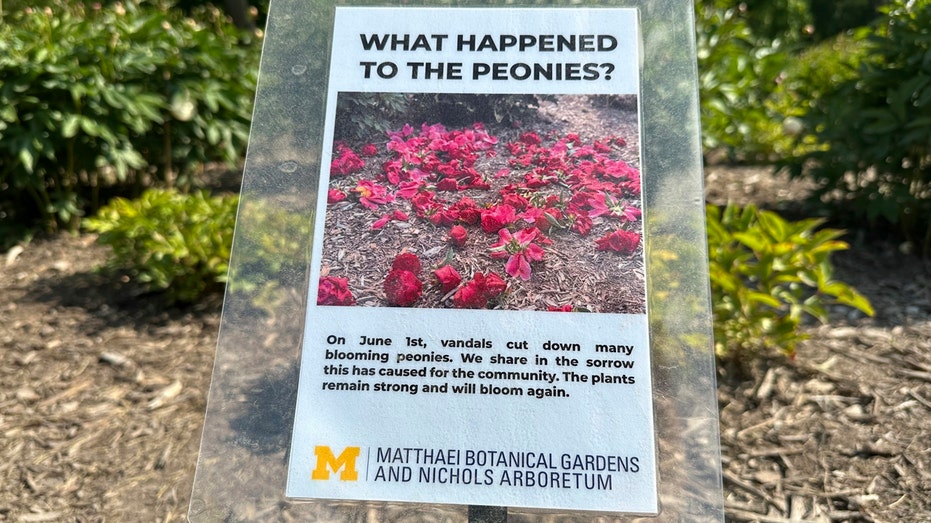Historic University Garden Vandalized in Apparent Anti-Israel Protest: 'Don't Waste Your Tears'
University of Michigan's iconic peonies vandalized in suspected protest against Israel, with approximately 250 flowers cut Sunday morning.

Hundreds of historic peonies at the University of Michigan's W.E. Upjohn Peony Garden were discovered vandalized over the weekend, dealing a major blow to one of the largest and most celebrated collections of its kind in North America. According to university officials, approximately 250 peony plants—around one-third of the garden’s entire collection—were found with their flowers cut off early Sunday morning, sparking outrage and disappointment among community members and garden enthusiasts alike.
The brazen act, which comes at the peak of the garden’s blooming season, quickly drew condemnation from university leadership. In a strongly worded statement, officials emphasized, "We unequivocally condemn the destruction of property and any act of vandalism on our campus." They added that Nichols Arboretum, home to the Upjohn Peony Garden, is meant to be a place for reflection and hope, underscoring that the destruction was "counter productive" to the community's values. The garden, which typically boasts an annual display of about 10,000 blooms, now faces a significant setback during what is usually a highlight of spring in Ann Arbor.
Investigators from the Division of Public Safety & Security (DPSS) are treating the incident as a criminal matter. While no suspects have been identified, papers left at the scene revealed an apparent motive tied to pro-Palestinian sentiments. The messages read in part, "Plant lives don't matter. Human lives do. Stop the war. Resist Imperialism." and "Palestinian lives deserve to be cared for. More than these flowers. Don't waste your tears on the peonies. They are not even dead and will grow again next spring." These notes suggest the act was intended as a protest against ongoing conflicts overseas and as a statement prioritizing human life over botanical preservation.
This isn't the first time the University of Michigan has experienced politically motivated vandalism on campus. Last fall, the home of university president Santa Ono was reportedly spray-painted with phrases such as "intifada" and "coward," incidents that further heightened tensions within the university community. These acts are part of a broader pattern of unrest seen at college campuses across the country amid heightened debates regarding the conflict in the Middle East.
The timing of the vandalism at the peony garden coincided with a violent incident in Boulder, Colorado, where a pro-Israel demonstration was allegedly attacked, leaving multiple individuals injured. Federal authorities reported that the suspect in that case harbored explicit anti-Zionist motivations. The convergence of these high-profile incidents underscores the increasingly charged atmosphere on and around college campuses related to international political disputes.
As the investigation continues, university officials urge the campus community to channel activism and advocacy through "constructive and meaningful dialogue" rather than acts of destruction. The Division of Public Safety & Security has assured that they are pursuing every lead and encourages anyone with information to come forward.
The setback to the W.E. Upjohn Peony Garden is a painful moment for supporters and caretakers who dedicate countless hours to preserving its historic collection. Still, as noted in both the vandals' message and from horticultural experts, the peonies themselves are resilient. Most are expected to bloom again next spring, but for many in Ann Arbor, the damage marks a somber chapter in the garden’s nearly century-old legacy.




